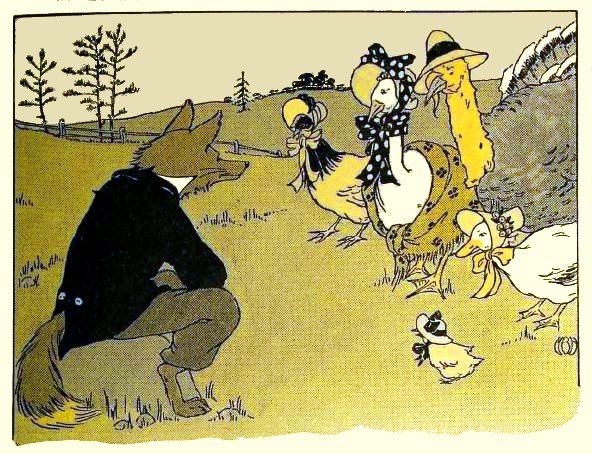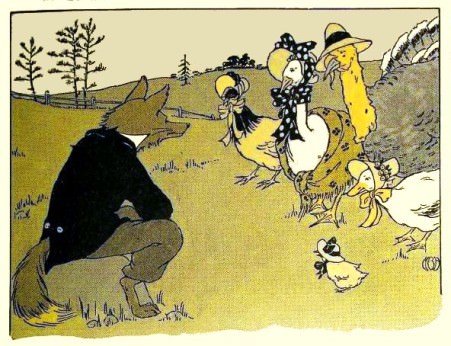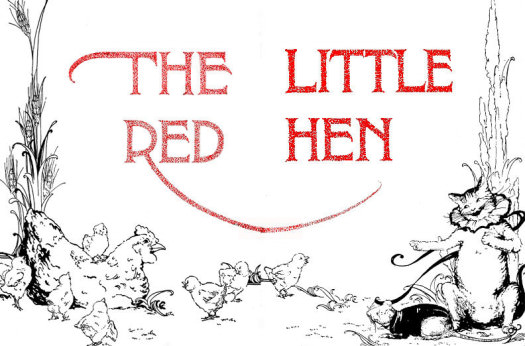Chick Lit: Some Famous and Not-So-Famous Poultry on the Page
Chickens have inspired some of America’s greatest writers.
Chick Lit: Some Famous and Not-So-Famous Poultry on the Page
Chickens have inspired some of America’s greatest writers.

As they run around the barnyard spooked by who knows what, chickens (to me) seem to resemble elderly church ladies trying to get out of a rainstorm, afraid that their Sunday best will be ruined. Perhaps this is why these birds have managed to make their way into a variety of stories over the years, many aimed at children.
If you’ve spent any time with these fowl, you can see how their behaviors have inspired literary characters, especially “Chicken Little“ and “The Little Red Hen,” arguably the two most famous chickens in classic children’s literature.
In the former, Chicken Little becomes convinced the sky is falling when an acorn hits her in the head (in other versions it’s a leaf) and manages to freak out her fellow animal friends causing mass hysteria. The story is old – like 500 BC old, if you trace it back to its origins. According to the writer Mabel Kaplan, the story is based on “The Flight of the Animals,” found in an early collection of Indian stories about the Buddha. Now, there are countless versions and even names for the story, including “Henny Penny,” “Chicken-Licken,” or “Chicken-Diddle.” In some of these older tales, Chicken Little and her friends fall prey to a smooth-talking fox who lures them to his den and eats them. This bloody conclusion to the story could be chalked up to the age of the tale. Our ancestors didn’t pull punches when it came to children’s stories. (Check out the Brothers Grimm’s versions of the classic fairy tales, if you don’t believe me.)
By the mid-19th century the story had found its way to the U.S. and quickly became a staple of children’s literature.

“The Little Red Hen” began life as a folktale with either Russian or English roots (there’s some debate) that was passed down orally for generations before it was eventually written down. The folklorist Joseph Jacobs, who included it in a book of folktales he collected in the 1890s, is often credited with being the first to get it down on paper, but there’s an earlier Irish version – “The Wonderful Cake” – that is a fusion of “The Little Red Hen” and “The Gingerbread Man,” collected by the writer Patrick Kennedy 30 years earlier. “The Little Red Hen” is the story of an industrious chicken who asks for help from her lazy barnyard friends and receives none as she goes about the long process of growing, harvesting, and milling wheat that she eventually turns into bread (very artisanal chicken). The book found a massive American audience through the popular Little Golden series, beginning in the 1940s.
Hens’ mothering behavior also figured in a 1946 story, “The Chicken Book,” by author and illustrator Garth Williams, best known for his drawings for E.B. White’s “Charlotte’s Web” and “Stuart Little.” The story is about five newly hatched chicks learning the ropes from their mother.

Over the years, chickens have managed to find their way into more books, squeezing in between cuter animals, but there are some more obscure chicken-centered stories written by some very famous writers. Nope, “Cock-A-Doodle-Doo!“ by Herman Melville isn’t a sequel to “Moby Dick.” There’s no Captain Ahab searching the barnyard for a great white chicken. This short story, first published in 1853, is about a man down on his luck and a rooster who inspires both the protagonist and others.
“Dalkins’ Little Indulgence – A Christmas Story“ by Robert Frost, who is better known for his poetry than stories involving poultry, appeared in 1905 in The Farm-Poultry, a Boston journal that is pretty much summed up by its name. The story centers on a prized chicken, the angry seller who felt he should have gotten more for the hen, and the farmer who eventually teaches the man a lesson.

So here’s to all the chickens who have inspired great art, or at least a pretty good tale or two. Let’s hope poultry keeps on sparking the imaginations of the world’s writers and illustrators. For more high-brow chicken tales, be sure to check out the blog “Chickens in Literature.”
Follow us
This work is licensed under a Creative Commons Attribution-NoDerivatives 4.0 International License.
Want to republish a Modern Farmer story?
We are happy for Modern Farmer stories to be shared, and encourage you to republish our articles for your audience. When doing so, we ask that you follow these guidelines:
Please credit us and our writers
For the author byline, please use “Author Name, Modern Farmer.” At the top of our stories, if on the web, please include this text and link: “This story was originally published by Modern Farmer.”
Please make sure to include a link back to either our home page or the article URL.
At the bottom of the story, please include the following text:
“Modern Farmer is a nonprofit initiative dedicated to raising awareness and catalyzing action at the intersection of food, agriculture, and society. Read more at <link>Modern Farmer</link>.”
Use our widget
We’d like to be able to track our stories, so we ask that if you republish our content, you do so using our widget (located on the left hand side of the article). The HTML code has a built-in tracker that tells us the data and domain where the story was published, as well as view counts.
Check the image requirements
It’s your responsibility to confirm you're licensed to republish images in our articles. Some images, such as those from commercial providers, don't allow their images to be republished without permission or payment. Copyright terms are generally listed in the image caption and attribution. You are welcome to omit our images or substitute with your own. Charts and interactive graphics follow the same rules.
Don’t change too much. Or, ask us first.
Articles must be republished in their entirety. It’s okay to change references to time (“today” to “yesterday”) or location (“Iowa City, IA” to “here”). But please keep everything else the same.
If you feel strongly that a more material edit needs to be made, get in touch with us at [email protected]. We’re happy to discuss it with the original author, but we must have prior approval for changes before publication.
Special cases
Extracts. You may run the first few lines or paragraphs of the article and then say: “Read the full article at Modern Farmer” with a link back to the original article.
Quotes. You may quote authors provided you include a link back to the article URL.
Translations. These require writer approval. To inquire about translation of a Modern Farmer article, contact us at [email protected]
Signed consent / copyright release forms. These are not required, provided you are following these guidelines.
Print. Articles can be republished in print under these same rules, with the exception that you do not need to include the links.
Tag us
When sharing the story on social media, please tag us using the following: - Twitter (@ModFarm) - Facebook (@ModernFarmerMedia) - Instagram (@modfarm)
Use our content respectfully
Modern Farmer is a nonprofit and as such we share our content for free and in good faith in order to reach new audiences. Respectfully,
No selling ads against our stories. It’s okay to put our stories on pages with ads.
Don’t republish our material wholesale, or automatically; you need to select stories to be republished individually.
You have no rights to sell, license, syndicate, or otherwise represent yourself as the authorized owner of our material to any third parties. This means that you cannot actively publish or submit our work for syndication to third party platforms or apps like Apple News or Google News. We understand that publishers cannot fully control when certain third parties automatically summarize or crawl content from publishers’ own sites.
Keep in touch
We want to hear from you if you love Modern Farmer content, have a collaboration idea, or anything else to share. As a nonprofit outlet, we work in service of our community and are always open to comments, feedback, and ideas. Contact us at [email protected].by Andrew Amelinckx, Modern Farmer
March 18, 2016
Modern Farmer Weekly
Solutions Hub
Innovations, ideas and inspiration. Actionable solutions for a resilient food system.
ExploreExplore other topics
Share With Us
We want to hear from Modern Farmer readers who have thoughtful commentary, actionable solutions, or helpful ideas to share.
SubmitNecessary cookies are absolutely essential for the website to function properly. This category only includes cookies that ensures basic functionalities and security features of the website. These cookies do not store any personal information.
Any cookies that may not be particularly necessary for the website to function and are used specifically to collect user personal data via analytics, ads, other embedded contents are termed as non-necessary cookies.